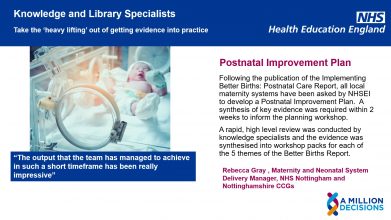Key aspects of the role
- Developing a close working relationship with commissioners and place-based health decision makers.
- Keeping up to date with NHS organisational change and activities relating to commissioning and service redesign.
- Providing evidence-based knowledge and information through the use of advanced literature-searching skills, compiling summaries of evidence to inform commissioning decisions.
- Presenting current awareness alerting services based on commissioners’ known interests and needs.
- Facilitating opportunities for those involved in commissioning to network and share their knowledge and learning.
- Providing a link for non-traditional, community-based health services to access core NHS health library and knowledge services.

Skills and knowledge
You may require a high level of knowledge and skills in the following CILIP Professional Knowledge and Skills Base (PKSB) sections to work within this role:
Ethics and Values. Underpinning healthcare ethics and values by providing the best available evidence at the right time, in the right place, to inform decision-making and enable better outcomes for patients and populations.
Professional development. Reflecting on practice and being self-aware about performance.
Organisational and environmental context. Understanding organisational priorities and challenges identified by the executive team.
Wider library, data, information and knowledge sector context. Networking across the healthcare economy, both information providers, data analysts and health informaticists, to support shared learning and joint working
Data Management. Understanding and supporting service users with research data management, assisting with institutional repositories or signposting alternative repositories.
Information exploitation and use. Determining specific information needs through techniques such as the reference interview and enhancing the rigour of search services through the use of search protocols and procedures.
Information management. Advising the organisation on the opportunity to improve information management
Knowledge management. Embedding knowledge management into ways of working – for example facilitating a Before Action Review before an organisational project commences and an After Action Review at its conclusion.
Records management and archiving. Providing training and education in record-keeping literacy skills, including the management of records generated by users.
Research. Helping users to find, appraise and apply research in practice.
Customer focus. Service design and marketing. Engaging with a variety of users across the healthcare landscape to provide a professional and efficient service
Leadership, advocacy, influencing and personal effectiveness. Developing knowledge of trends on healthcare provision and national legislation which influences the healthcare landscape and structures (for example, integrated care systems).
Technology and communication. Reading and synthesizing texts which use specialist healthcare language and applying knowledge of appropriate terminology when searching for evidence.
Further information about the CILIP Professional Knowledge and Skills Base
Communities of Practice
60 seconds with… Erica Rae, Public Health and Commissioning Librarian
In a sentence what does your job entail? I provide a comprehensive Evidence-finding and current awareness service to our local Public Health team and Clinical Commissioning Group (CCG), and act as a conduit for them to our full range of Library Services
Tell us about your proudest achievement at work? Being a bit of a trail-blazer for the type of work that I do – it’s a pretty niche role in an already relatively small field, and it’ satisfying to know that I’ve carved it out for myself
Are there things that you do in your job that would surprise others? I rarely work in the library – in this outreach role I’m mostly embedded with my core customers by hot-desking with them at their locations, and one of these isn’t even NHS-based; Public Health are now part of the local authority, so I’ve had to get to grips with the workings of our County Council
What is your top career tip? Keep learning – take advantage of any suitable CPD opportunities or training courses to update your knowledge and skills
How do you see your role changing over the next couple of years? I’m at the mercy of budget restrictions and organisational changes of my key stakeholders and how this will affect them – hopefully my role won’t change at all!
What is the most challenging thing you have dealt with at work? Having to deal with the lack of understanding of the relevance of my role by the CCG
Have you got any hidden talents? Dogged persistence…
What do you enjoy most about your role? Autonomy – I’m given pretty free rein to go out there and do it my way (within the bounds of a professional service, of course) whilst knowing that I have both managerial and personal support back at base when I need it
Is there anything else you would like to tell us about your role? Whilst I love the freedom it brings being in an outreach role can be isolating – it’s never easy being the only specialist in my field amongst a group of public health or commissioning practitioners. To combat this I make sure I maintain regular contact with my library colleagues back at base, as well as wider professional networks, both face-to-face & virtually